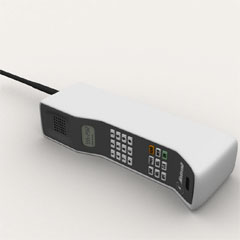 A lawyer for a wireless industry group asked a federal appeals court today to block a San Francisco law that requires retailers to hand out radiation exposure warnings when they sell cell phones.
A lawyer for a wireless industry group asked a federal appeals court today to block a San Francisco law that requires retailers to hand out radiation exposure warnings when they sell cell phones.
Andrew McBride, representing the Washington, D.C.-based CTIA-The Wireless Association, argued the warnings violate phone makers’ free speech rights by forcing them to give an allegedly misleading and controversial message they don’t agree with.
Wireless phone makers “want to say, ‘Enjoy your new phone and use it,'” McBride told a three-judge panel of the 9th U.S. Circuit Court of Appeals at a hearing in San Francisco.
“But the city of San Francisco makes them say, ‘Hey, wait a minute, this device may cause cancer and use it sparingly,'” McBride said.
“That’s the opposite of what we want to say,” he told the panel.
Deputy City Attorney Vince Chhabria argued the measure is merely a “consumer disclosure requirement” justified by public health concerns.
“What about the consequences if the risk bears out? We’re talking about (alleged possible) malignant brain cancer here,” he told the court.
“San Francisco has to look at this from the perspective of government and the perspective of public health,” Chhabria said.
The measure, entitled the “Cell Phone Right to Know Law,” was enacted by the city Board of Supervisors in 2010 and revised last year. It has been put on hold during the industry’s challenge.
The law would require cell phone retailers to hand out a fact sheet prepared by the city, display a poster and place stickers on phones informing customers of an alleged possible risk from radio-frequency energy and ways they can reduce their exposure.
Last year, in response to a CTIA lawsuit, U.S. District Judge William Alsup of San Francisco issued a preliminary injunction blocking the display of posters on store walls and stickers on phones. He said both intruded on the retailers’ own messages.
But Alsup allowed a modified version of the city’s fact sheet, saying governments have the right to require the disclosure of “accurate and uncontroversial facts” related to public health and safety.
Both sides are appealing. The CTIA has asked the appeals court to bar the use of the fact sheet until a full trial is held on its lawsuit.
The city wants the court to lift the stay on distributing the fact sheet and also to reinstate the other two requirements of the law.
The appeals panel took the case under consideration after hearing an hour of arguments. It has no deadline for issuing a decision.
As modified by Alsup, the fact sheet now contains a reference to the Federal Communications Commission’s existing safety standards, which cell phone makers must follow.
It states, “Although all cell phones sold in the United States must comply with radio-frequency safety limits set by the Federal Communications Commission, no safety study has ever ruled out the possibility of human harm from RF exposure.
“RF energy has been classified by the World Health Organization as a possible carcinogen (rather than as a known carcinogen or a probable carcinogen) and studies continue to assess the potential health effects of cell phones,” the fact sheet says.
McBride called the fact sheet “almost laughable” and said it misleads consumers into fearing risks that haven’t been proved.
“There is no evidence cell phones actually cause harm,” he said.
In response, Chhabria noted that under California’s Proposition 65, a 1986 voter initiative, a World Health Organization rating of a chemical as a “possible carcinogen” is enough to trigger a mandatory cancer warning on products containing that chemical.
In addition to arguing that the San Francisco law violates free speech, the CTIA contends the measure is preempted by the FCC regulations.
Julia Cheever, Bay City News
Want more news, sent to your inbox every day? Then how about subscribing to our email newsletter? Here’s why we think you should. Come on, give it a try.









